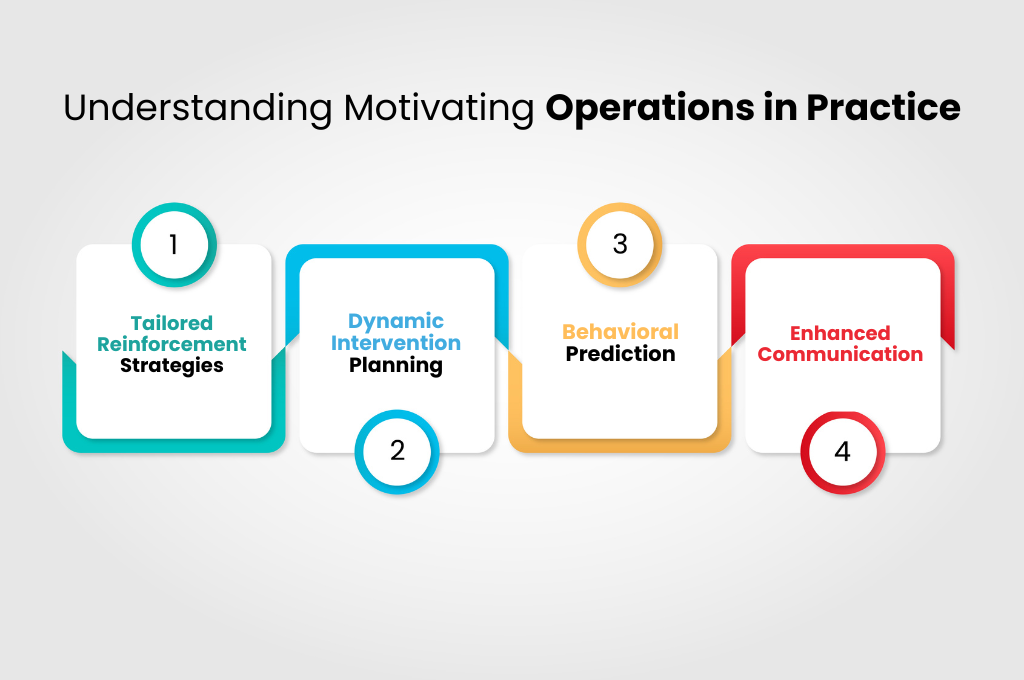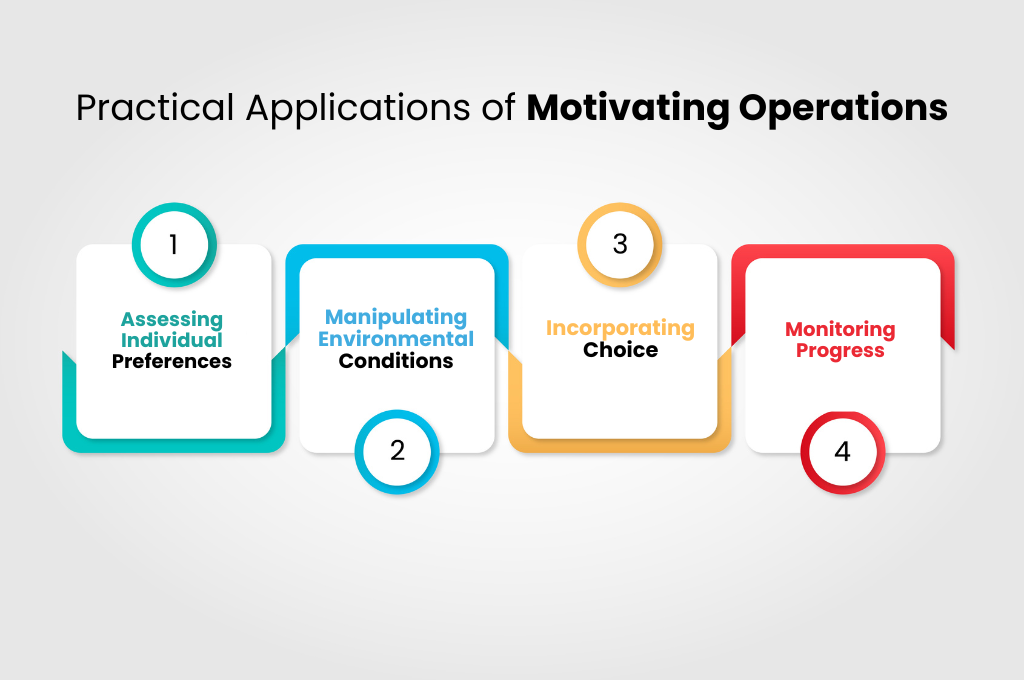Motivating Operations in ABA: Unlocking the Power of Behavior Change
ABA TherapyJuly 17, 2025

Applied Behavior Analysis (ABA) is a powerful therapeutic approach that helps individuals with autism spectrum disorder (ASD) and other developmental challenges. One of the key concepts within ABA is "motivating operations" (MOs), which play a crucial role in understanding and influencing behavior.
In this blog post, we'll dive deep into what motivating operations are, how they function, and their significance in ABA therapy. By the end, you’ll have a clearer understanding of how to apply these principles to promote positive behavior change.
What Are Motivating Operations?
Motivating operations (MOs) are a fundamental concept in Applied Behavior Analysis (ABA) that help us understand how various environmental factors influence behavior. At their core, MOs are events or conditions that alter the effectiveness of a reinforcer and subsequently affect the likelihood of a specific behavior occurring. They set the stage for behavior by influencing both the desirability of a reinforcer and the motivation to engage in certain actions.
The Role of Motivating Operations
To grasp the significance of motivating operations, it's essential to recognize that behaviors do not occur in a vacuum. Instead, they are influenced by a myriad of factors, including:
- Internal states: Such as hunger, thirst, or fatigue.
- Environmental conditions: Such as the presence or absence of specific stimuli.
- Social contexts: Such as interactions with peers or caregivers.
MOs can be thought of as the "setting" that influences whether a behavior will be reinforced or not. By understanding these operations, therapists and caregivers can better tailor interventions to meet an individual’s unique needs.
Types of Motivating Operations
There are two primary types of motivating operations: Establishing Operations (EOs) and Abolishing Operations (AOs). Each type plays a distinct role in shaping behavior.
1. Establishing Operations (EOs)
Establishing Operations increases the effectiveness of a reinforcer, making it more desirable and motivating for an individual to engage in certain behaviors. EOs create a heightened state of need or desire, which can lead to an increased likelihood of specific behaviors being exhibited.
Example: Consider a child who is feeling hungry. In this scenario, food becomes a highly effective reinforcer for behaviors such as:
- Asking for snacks: The child may be more inclined to verbally request food rather than simply waiting for it to be offered.
- Completing tasks: If the child knows that finishing their homework will lead to snack time, they are more likely to complete their assignments promptly.
In this case, hunger serves as an EO that enhances the value of food as a reinforcer, thereby increasing the likelihood of behaviors associated with obtaining food.
2. Abolishing Operations (AOs)
Abolishing Operations, on the other hand, decreases the effectiveness of a reinforcer. When an AO is present, the value of certain reinforcers diminishes, leading to a reduced likelihood that specific behaviors will occur.
Example: Continuing with our hunger example, if the same child has just eaten a large meal, food is no longer a potent reinforcer. As a result:
- Asking for snacks: The child may not feel motivated to ask for snacks since they are no longer hungry.
- Completing tasks: The prospect of receiving food as a reward for completing homework may not be enticing enough to encourage them to finish their assignments.
In this case, having recently eaten serves as an AO that reduces the effectiveness of food as a reinforcer, thereby decreasing the likelihood of behaviors associated with seeking food.
Understanding Motivating Operations in Practice

Recognizing and understanding motivating operations is crucial for therapists and caregivers working with individuals with autism and other developmental challenges. Here’s how this knowledge can translate into effective interventions:
- Tailored Reinforcement Strategies: By assessing current motivating operations, therapists can select appropriate reinforcers based on an individual's immediate needs and preferences. This ensures that rewards are meaningful and effective in promoting desired behaviors.
- Dynamic Intervention Planning: MOs can change over time due to various factors such as health status, emotional state, or environmental changes. Therapists must remain flexible and responsive to these shifts to maintain effective interventions.
- Behavioral Prediction: Understanding MOs allows therapists to predict when certain behaviors are likely to occur based on current conditions. This predictive ability can inform proactive strategies that prevent challenging behaviors before they arise.
- Enhanced Communication: By recognizing how MOs influence behavior, caregivers can improve communication strategies with individuals who may struggle to express their needs. For instance, teaching alternative ways to communicate hunger or discomfort can lead to better outcomes.
The Importance of Motivating Operations in ABA
Incorporating motivating operations into ABA therapy is essential for several reasons:
1. Enhancing Reinforcement Strategies
By recognizing what motivates an individual at any given moment, therapists can select more effective reinforcers. For instance, if a child is tired after a long day, offering playtime as a reward may not be effective. Instead, providing quiet time or a favorite activity might yield better results.
2. Increasing Engagement
Motivating operations can help maintain engagement during therapy sessions. When therapists understand what drives an individual’s motivation, they can tailor activities to align with those motivations, making learning more enjoyable and effective.
Practical Applications of Motivating Operations

What are Socially Significant Behaviors?
Now that we understand what motivating operations are and their importance, let’s explore some practical ways to apply this concept in ABA therapy:
1. Assessing Individual Preferences
Conduct preference assessments to identify what items or activities serve as effective reinforcers for each individual. This could involve presenting various options and observing which ones elicit the most interest or engagement.
2. Manipulating Environmental Conditions
Adjust environmental factors to create optimal conditions for learning. For example:
- Creating an EO: If you want to encourage communication, you might limit access to preferred toys until the child requests them verbally.
- Implementing an AO: If you notice that a child is becoming overly excited during playtime, introducing brief breaks can help reduce overstimulation and refocus their attention.
3. Incorporating Choice
Allowing individuals to make choices can significantly enhance motivation. When they have control over their activities or rewards, they are more likely to engage positively with the learning process.
4. Monitoring Progress
Regularly assess how changes in motivating operations affect behavior outcomes. This ongoing evaluation allows for adjustments in strategies based on real-time data.
Challenges in Understanding Motivating Operations
While motivating operations are fundamental in ABA, they can also present challenges:
- Variability: MOs can change frequently based on context or individual circumstances, making it essential for therapists to stay attuned to these shifts.
- Misinterpretation: Sometimes behaviors may be misattributed to MOs when they stem from other factors such as medical issues or emotional states.
Therapists must remain vigilant and flexible in their approach to accurately assess and respond to motivating operations.
Conclusion: The Path Forward with Motivating Operations
Motivating operations are vital tools in the ABA therapist's toolkit. By understanding and leveraging these concepts, practitioners can create more effective interventions that resonate with individuals’ needs and motivations.
At Illuminate ABA, we are committed to providing high-quality therapy tailored to each child's unique requirements. Our experienced team utilizes principles like motivating operations to foster meaningful behavior change and enhance overall well-being.
If you're seeking support for your child or loved one with autism spectrum disorder or other developmental challenges, we invite you to explore our services at Illuminate ABA Therapy.
Together, we can illuminate the path toward progress and growth! By integrating insights on motivating operations into your understanding of ABA therapy, you empower yourself with knowledge that enhances both practice and outcomes for individuals on their journey toward success.
Learn More About: Early Intensive Behavioral Intervention (EIBI)


